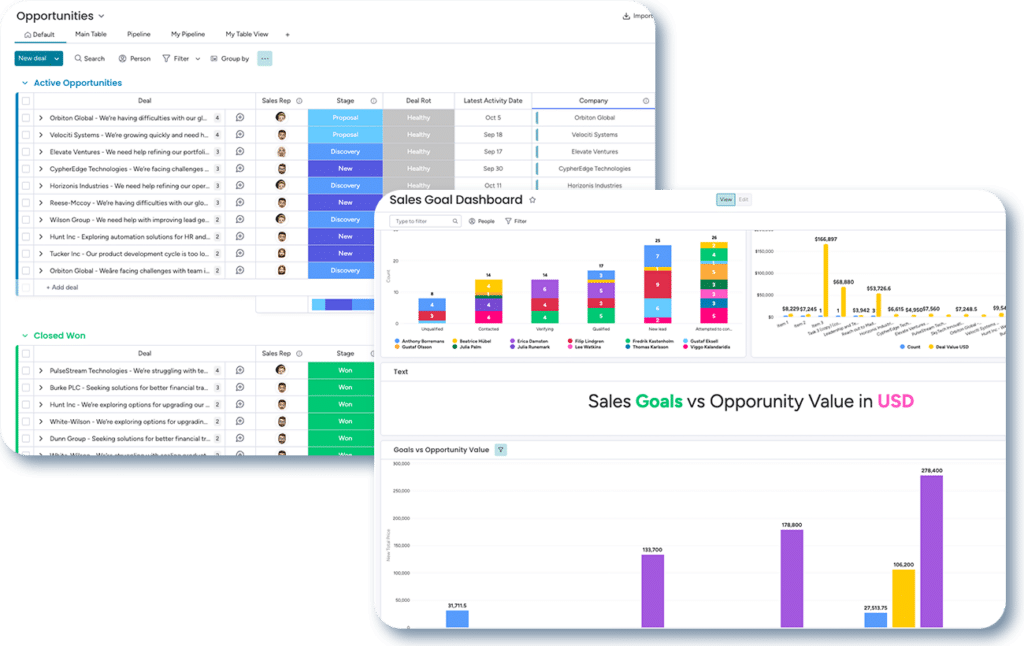Understanding the CRM Evolution
In today’s interconnected world, businesses are increasingly leaning towards global outreach. This worldwide scope calls for tools that can unify teams from different geographies, ensuring consistent communication and seamless workflow. Enter CRM (Customer Relationship Management) systems. These tools, initially designed to manage and analyze customer interactions, have seen a significant evolution in their capabilities and deployment methods. The transition from traditional on-premise CRM systems to the more agile, cloud-based CRM systems has revolutionized how businesses approach customer relationship management. In this digital age, the benefits of cloud-based CRM systems, for global teams especially, are starting to outweigh the traditional on-premise CRM.
Cloud-based CRM
As businesses expand and transcend borders, the necessity for tools that cater to a global audience becomes paramount. The benefits of cloud-based CRM systems for global teams are numerous, ranging from real-time data access to collaboration capabilities that bridge the geographical divide. This article delves into the profound advantages cloud-based CRM offers to global teams, providing insights and actionable knowledge to businesses aiming to thrive in this digital age.
What is a Cloud-based CRM System?
A Cloud-based Customer Relationship Management (CRM) system is a platform that manages a company’s interactions with current and potential customers using cloud computing. Unlike traditional CRMs which require an on-premise setup and manual updates, cloud-based CRMs are hosted on the internet and can be accessed through any device with an online connection. This offers unparalleled flexibility, especially pertinent to businesses with a global outreach.
Contrasting Traditional and Cloud-based CRM
While both traditional and cloud-based CRM systems aim to improve customer relations, their method of deployment and operation varies significantly. Traditional CRM systems, often housed within a company’s internal server infrastructure, can become cumbersome with the need for regular manual updates, hardware maintenance, and restricted access. On the other hand, cloud-based CRMs thrive on accessibility, automatic updates, and real-time data synchronization. When we consider the benefits of cloud-based CRM systems for global teams, this distinction becomes even more pronounced, as global teams demand agile tools to cater to their dynamic needs.
Key Benefits of Cloud-based CRM Systems for Global Teams
Unrestricted Accessibility from Anywhere
One of the primary benefits of cloud-based CRM systems for global teams is the ability to access vital customer data from anywhere in the world. With just an internet connection, teams spread across various geographical locations can tap into the CRM. This ensures that crucial client information is always at their fingertips, regardless of their physical location.
Real-time Collaboration Across Borders
In a world where timely decision-making can set companies apart, cloud-based CRMs enable global teams to collaborate in real time. From sales representatives in the U.S. to marketers in Asia, everyone can view, update, and act upon the same data simultaneously. This eliminates potential delays and misunderstandings.
Cost Efficiency in Operations
Migrating to the cloud means businesses can forego the substantial costs associated with infrastructure, manual updates, and hardware maintenance. This cost efficiency is especially beneficial for global enterprises, allowing them to allocate resources more effectively across their operations.
Scalability
Global businesses are ever-evolving. Cloud-based CRMs allow these businesses to scale their operations up or down based on demand. This ensures that the system always aligns with the company’s current needs without redundant costs.
Integrated Communication Tools for Cohesive Functioning
For global teams, communication is paramount. Modern cloud-based CRM systems come equipped with integrated communication tools. This ensures that teams remain connected and aligned in their goals, regardless of the distances that separate them.
Robust Security Measures
The cloud might raise security concerns for some. However, leading cloud-based CRM providers prioritize data safety with features like encryption, multi-factor authentication, and regular backups. Global teams can rest assured that their invaluable customer data remains protected against potential threats.
Automated Updates for Seamless Operations
Automatic updates are another highlight. They ensure that global teams always operate using the latest features, without the hassles of manual installations. This also ensures that teams are always equipped with the latest security patches, enhancing data protection.
Omnitas Newsletter
Sign up for our monthly newsletter to stay up-to-date on our latest blog articles, videos and events!
Thank you!
You have successfully joined our subscriber list.
Enhancing Workflow and Productivity
The Power of Automated Workflows
Automated workflows stand out as one of the most significant benefits of cloud-based CRM systems for global teams. By automating routine tasks, these systems save precious time, reduce human error, and ensure that processes run smoothly. For global teams, this means tasks like lead nurturing, follow-ups, and data entry can be streamlined. This, in turn, allows team members to focus on more strategic aspects of their roles.
Data Analytics & Reporting for Informed Decisions
In the age of data-driven decision-making, cloud-based CRM systems are a goldmine. They offer powerful analytics tools that process vast amounts of data, providing global teams with actionable insights. Whether it’s sales trends, customer preferences, or campaign effectiveness, global teams can derive critical information to make informed decisions that align with business goals.
Integration Capabilities
Cloud-based CRMs are not isolated platforms. Their ability to integrate seamlessly with other tools, such as project management software (like monday.com) or automation platforms (like Make), empowers global teams to have all their essential tools in one interconnected ecosystem. This integration facilitates a smoother workflow, reduces data silos, and ensures that teams across different departments or regions can work cohesively.
Challenges to Consider
While the benefits of cloud-based CRM systems for global teams are numerous, it’s essential to also understand the potential challenges. Being prepared for these challenges ensures a smoother transition and effective utilization of the system.
The Hurdle of Data Migration
Transitioning from a traditional CRM system to a cloud-based solution means migrating vast amounts of data. This process can be complex, time-consuming, and fraught with potential data loss or corruption risks. Global teams must ensure they have a well-thought-out migration plan and possibly engage experts to aid in this transition.
Training & Adoption
Every new system introduces a learning curve. For global teams spread across various regions, ensuring that everyone is trained and comfortable with the new cloud-based CRM can be a logistical challenge. It’s crucial to provide comprehensive training resources, webinars, and support to ensure the entire team can leverage the CRM’s full capabilities.
Connectivity Issues
Cloud-based solutions inherently depend on internet connectivity. This offers unparalleled flexibility in access. But, it also means that in areas with unstable or slow internet connections, the CRM’s functionality might be compromised. Global teams must be prepared with backup solutions or alternative access methods in regions where internet connectivity could be an issue.
Potential Hidden Costs
While cloud-based CRMs can be cost-effective in many aspects, there might be hidden costs to consider. These can include expenses related to additional storage needs, premium features, or integrations with other platforms. Global teams should thoroughly evaluate their CRM choice to ensure transparency in cost structures.

Future of Cloud-based CRM Systems
The digital landscape is continually evolving, and with it, the benefits of cloud-based CRM systems for global teams are expanding. As we look towards the horizon, the future of these CRM systems promises even greater innovations and opportunities for businesses worldwide.
AI Integration and Predictive Analytics
Artificial Intelligence (AI) is reshaping the way businesses operate. The integration of AI into cloud-based CRM systems is poised to take customer relationship management to new heights. Predictive analytics, driven by AI, will enable global teams to anticipate customer needs, tailor marketing strategies, and proactively address potential issues, ensuring enhanced customer satisfaction.
Enhanced Customization and Personalization
Future CRM systems will offer even more advanced customization features, allowing businesses to tailor the platform to their unique needs. This means global teams can have a CRM system that aligns perfectly with their operational nuances, industry requirements, and regional preferences.
Strengthened Data Security Protocols
With increasing concerns about data breaches and cyber threats, the future of cloud-based CRMs will see even stronger security measures. Advanced encryption methods, biometric access controls, and AI-driven threat detection are just a few of the advancements we can expect.
Expanding Accessibility with 5G and Beyond
As the world gears up for the widespread adoption of 5G technology, cloud-based CRM systems will benefit immensely. Faster data transfer speeds, reduced latency, and enhanced connectivity will ensure that global teams can access their CRM data even more swiftly and reliably, no matter where they are.
Conclusion
In an era where global outreach and digital connectivity define business success, the benefits of cloud-based CRM systems for global teams have never been more pronounced. These dynamic platforms, designed for accessibility, flexibility, and real-time collaboration, have become the backbone for businesses aiming to build robust customer relationships across borders.
While challenges exist, as with any technological advancement, the prospects and opportunities far outweigh the hurdles. The future of cloud-based CRM systems is undeniably bright. It promises even more advanced features, integrations, and tools that will further empower global teams.
For businesses seeking to stay ahead of the curve, adopting and leveraging these CRM systems is not just a choice—it’s a strategic necessity. As global teams continue to rely on these platforms, the horizon promises further innovations, efficiencies, and successes in the realm of customer relationship management.
Take the Next Step with Omnitas Consulting
As one of the oldest and most esteemed partners of platforms like monday.com and Make, Omnitas Consulting is at the forefront of helping businesses unlock the potential of cloud-based CRM systems. With our unique blend of managerial and IT consulting expertise, we’re not just another consultancy; we’re your partners in digital transformation.
Ready to revolutionize your global operations and harness the full power of cloud-based CRM systems? Reach out to us today, and let’s embark on this transformative journey together.













